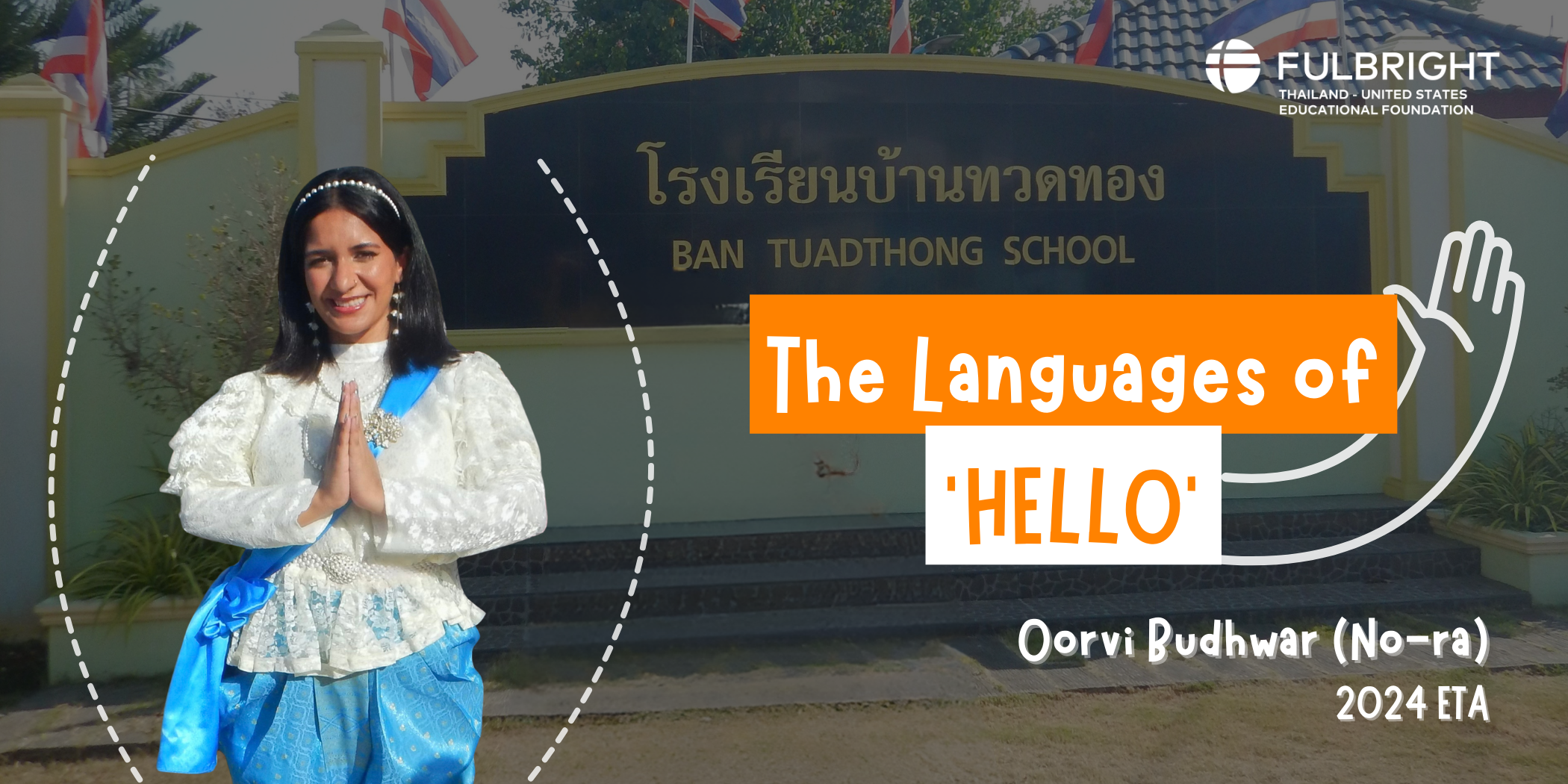The Languages of Hello
If this year has taught me anything, it’s that a simple “hello” can be expressed in many ways.
When I first arrived at the Suvarnabhumi Airport in Bangkok, I was met with a greeting of “Sawasdee ka!” a phrase I was only loosely familiar with. From my early days of “suadi-ka” to today’s “sa-wa-dee-ka,” with a few “wa-dee” sprinkled in between, my pronunciation and use of “hello” in Thai has connected me to people far and near. But the languages of hello have shown themselves in ways far beyond both “hello” and “สวัสดีค่ะ” during my year in Thailand as an English Teaching Assistant (ETA) with the Fulbright Program.
The Wai

Firstly, the icon of Thailand, and its fundamental salutation: the wai. Hands pressed together in prayer-like form, head bowed slightly. I learned it early, because it’s the greeting beyond any language in Thailand. It’s how I greet my neighbor, the shopkeeper, the parent on the street, and any person old and young. A wai is hello, thank you, respect, and apology all at once. Rooted in Buddhist and Hindu traditions, it’s also a blessing for the person you’re greeting. Sometimes it’s paired with “sawasdee ka,” but often it’s powerful enough on its own.
“Good Morning, Teacher”
Picture this: it’s your first day of class, with students you don’t know, in a country whose language you don’t speak. You walk into the classroom and begin to say “hello” and all the students stand up, clasp their hands into a wai, and in unison say, “Good morning, teacher.” It wasn’t with a voice of excitement. Nervously, you respond, “Good morning, students!” Silence. They remain standing. You remain standing. The moment stretches. Good thing that first days only happen once, because I soon learned the rest of the script:
It starts with all the students up and in unison, “Good morning/afternoon, Teacher.”
“Good morning/afternoon, students. How are you today?”
“I am fine, thank you. And you?”
“I am fine, thank you. Please sit down.”
And finally, it ends with an even louder, “Thank you, Teacher!” as the students take their seat..
Over time, we swapped “I am fine” for new emotions, but the ritual has stayed the same for my daily greeting as an English teacher – and a reminder of why I’m here.
The “Hello Song”

One structured ritual was followed by another not-so-structured one, which quickly became a fan favorite: the Hello Song. I stumbled on it on YouTube while looking for an icebreaker, and it has been stuck in my head ever since. For three minutes each class, we forget why we are there and we sing, dance, jump around, and sometimes form a “human train” snaking through the classroom. On days we skip it? Chaos. Excited for their weekly dose of “hello, hello,” students beg for even one minute of it before we settle into our lesson. It’s our shared greeting of joy at the start of each class.
“Nora”
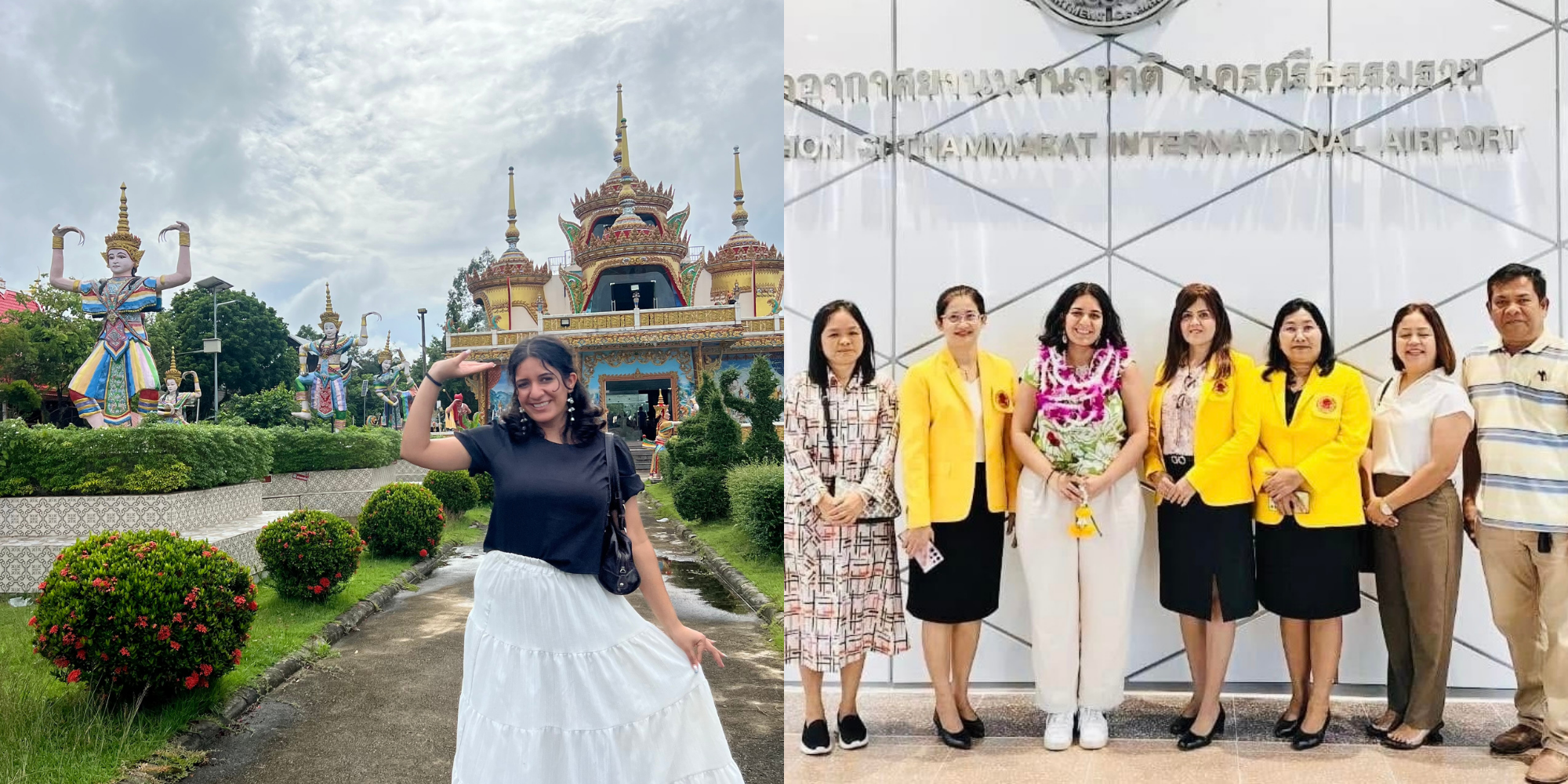
During the Fulbright orientation, I was introduced to the concept of nicknames in Thailand as a commonplace. The previous cohort shared theirs and their stories with it, which left me excited to find mine. Or in my case, for it to find me. On my first day in Nakhon, my school director and teachers received me at the airport and we headed to lunch. The early conversations were nothing short of awkward, and my two-week-old Thai stood no chance. During a lull, I asked my host teacher about everyone’s nicknames. They shared theirs and then came “and yours?” I shook my head “no.” After a pause, my director lit up: “Nora!” Teacher Bird, my host teacher explained it was the name of a local Southern-style dance known for harmonious melodies and ornate costumes. I am not much of a dancer, but the name stuck with me. To ease confusion over my actual name, I soon became Teacher Nora to my school. Now, a passing “Nora” from a teacher is as much a greeting as any “hello.”
“Gin Laew Mai?”
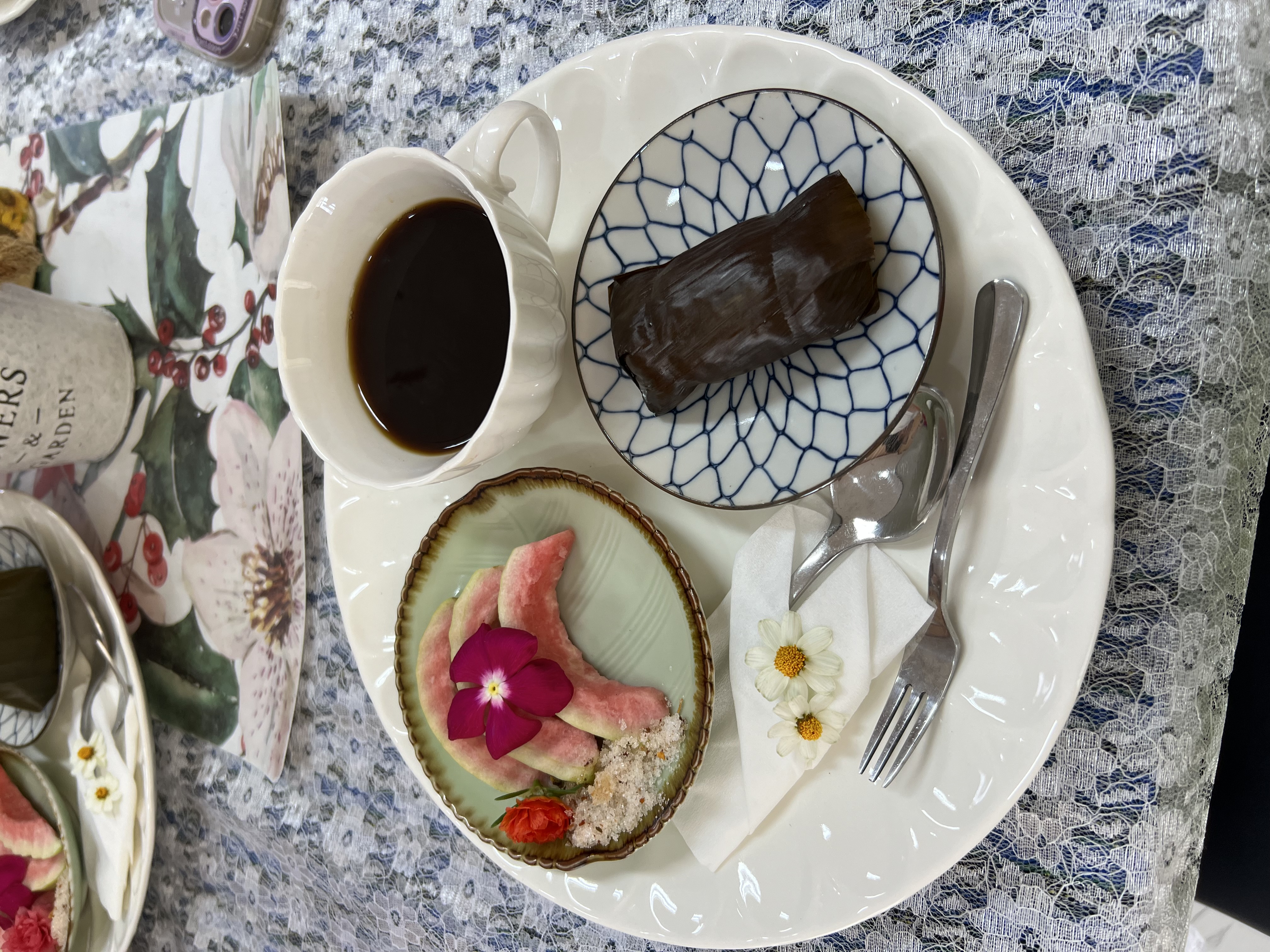
As a vegetarian in a meat-centered food culture, I struggled at first to join in shared meals. It left me feeling cut off from an important part of cultural exchange. I soon learned to clearly communicate my boundaries while showing genuine eagerness to participate in gatherings. Over time, my community responded with overwhelming kindness, going out of their way to include me. Soon, “Gin laew mai?” (“Have you eaten already?”) became a daily greeting as Thai donuts, fruit, or other khanom now await by the time I reach my desk in the mornings. Sometimes, “Gin laew mai?” isn’t a question at all, but rather an invitation (and saying “no” is never an option).
“Namaste”
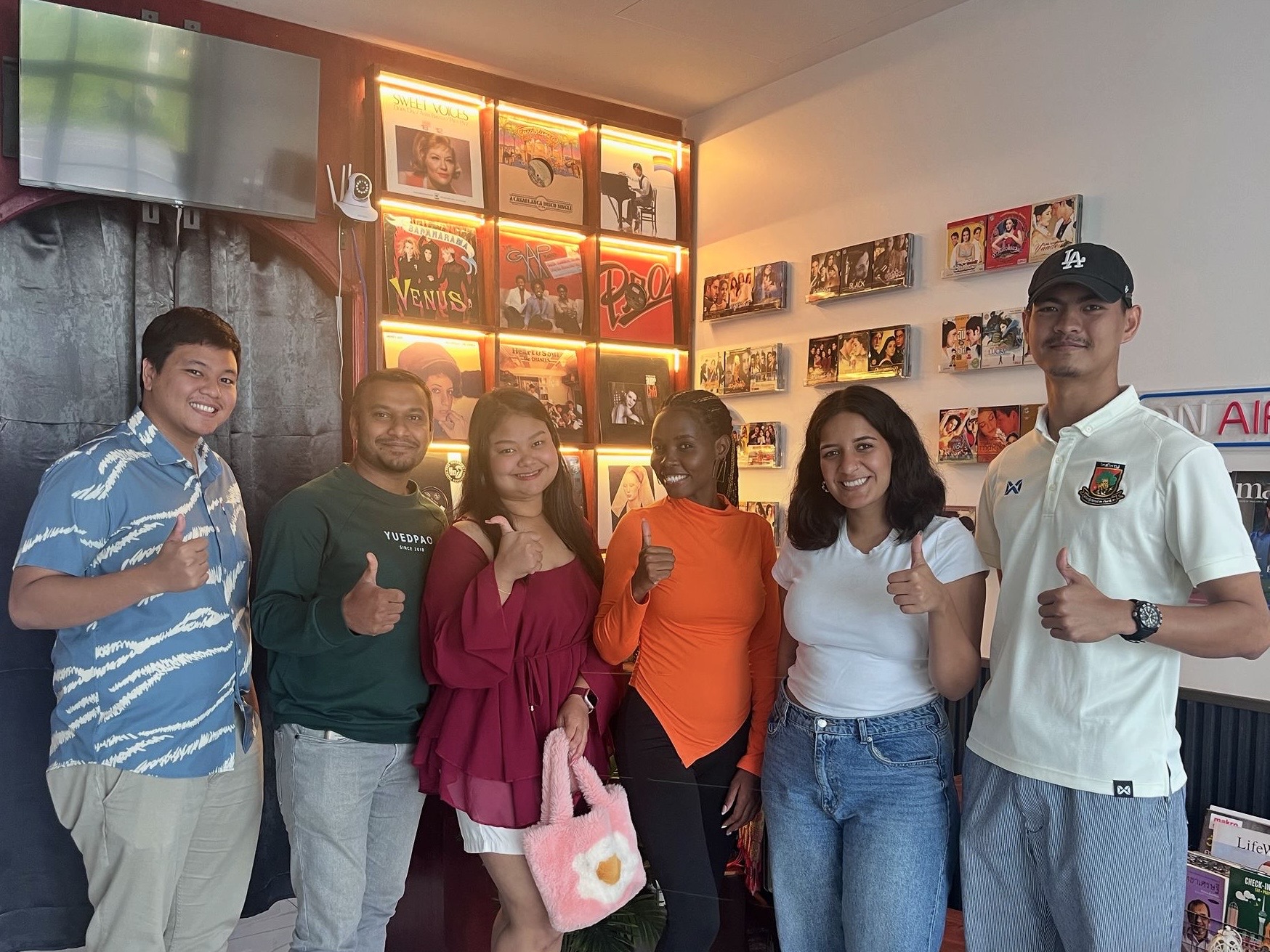

The first words I heard at Ban Thuad Thong School were, “Teacher India?” As someone who moved from India to the U.S. at a young age, my identity has always been central to how I see the world, and how the world sees me. Here, it has become a bridge between my students’ curiosity and my heritage, as I use the opportunity to teach about both my birthplace and the place I now call home. Last semester, one sixth grader began greeting me with “Namaste” after learning it was used in India. I felt deeply touched that he’d gone out of his way to learn a greeting from my mother tongue, and gave me a reminder of my roots. The feeling of being away from my community is something I share with the other foreign English teachers at my school as well: Teacher Joy from Kenya, Teacher Leslie from the Philippines, and Teacher Kami from India, who grew up in a town a few hours away from where I was born! Together, we swap languages, food, and stories from our cultures, building friendships that make daily life lighter. They remind me that even while far from our families, we have created our own home here – one built on community, support, and shared purpose, while still honoring our identities.
“DUDE!”
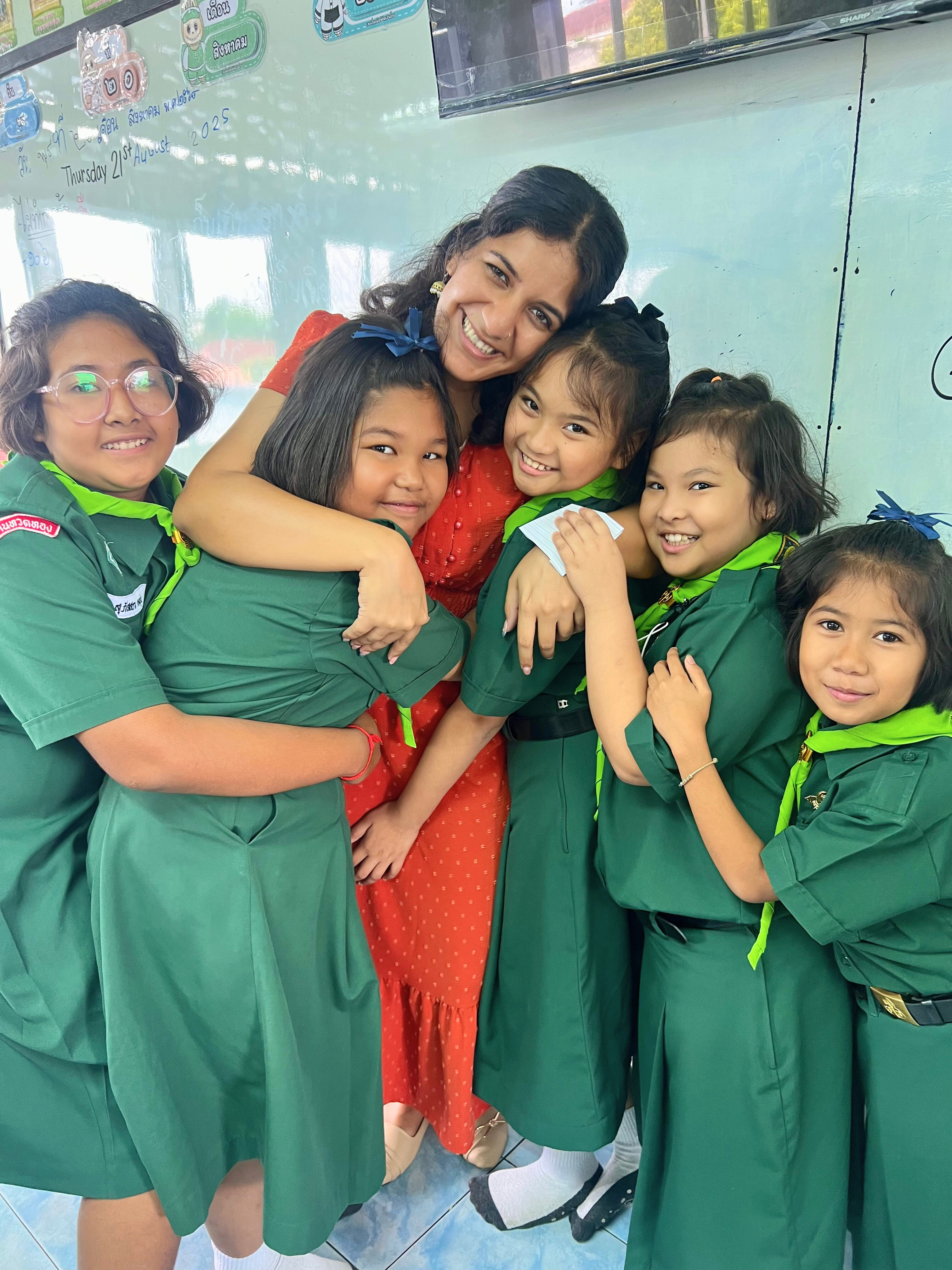
People say Americans are loud – and I have confirmed that it’s true. The pitch of any room instantly rises when I meet up with a fellow Fulbright ETA after months apart. It starts with an enthusiastic “DUDE!” followed by stories of their mischievous students who came to class only once during the entire semester, or when they met a local celebrity. Then, the “time is flying!” is followed by stories from home that serve as a reminder of what we left behind. These 19 other ETAs are among the few who really understand the strange balance of life in Thailand. Family can provide support from afar, and students can give love from near, but no one else understands the process of re-learning life in increments while being anchored here, but still tugging to float back home. This hello is rare, but each one reminds me of the friendships I’ve found here.
The Silent Ones

Some hellos need no words, and often speak louder than others. The soft smile of a shy student in the hallway. The waves from across the local market after school. The hug from a first grader who likely doesn’t remember my name. The handshake extended, then snatched away amid laughter. Even without language, these greetings share so much love and display the trust we have built throughout this year together.
Soon, these languages of hellos will turn into goodbyes, some just for now, others forever. But they’ll live on in my memory, every Sawasdee ka, every wave, every greeting, spoken or silent. They will forever serve as a reminder of my memorable time in Thailand as a Fulbright ETA.

Oorvi Budhwar, 2024-2025 Fulbright English Teaching Assistant (ETA)
at Ban Thuad Thong School in Nakhon Si Thammarat, Thailand

